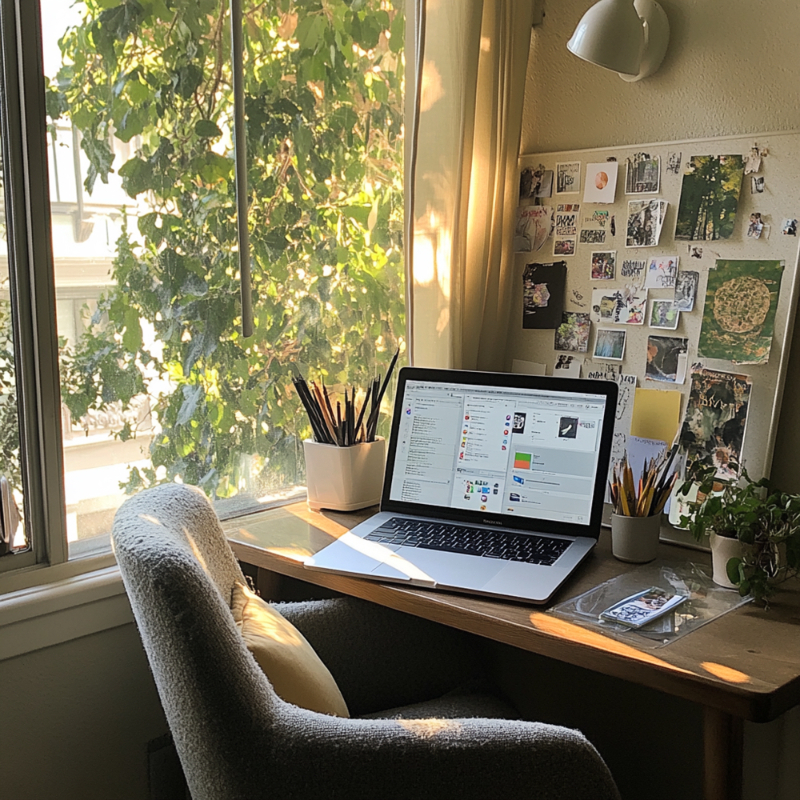Find out if you need planning permission for a home office conversion in the UK. Explore regulations, guidelines, and exceptions for creating a workspace at home, ensuring your renovation is compliant and hassle-free.
Does a Home Office Need Planning Permission?
Typically, you don't need planning permission for a home office if it is used exclusively for personal purposes and does not alter the character of your home. However, if you intend to make structural changes to your property or plan to host regular clients and visitors, it is likely that you will need to obtain planning permission.
Additionally, it is important to determine whether your property is located in a conservation area or is a listed building. Different rules often apply in these situations. For example, properties in conservation areas are subject to stricter regulations to preserve their character, and any modifications must be carefully considered.
If you reside in a flat, it is almost always necessary to secure planning permission for any changes, including the establishment of a home office. This is due to the shared nature of the building and the potential impact on other residents. Therefore, it is crucial to check the specific requirements that apply to your type of property and location.
The best course of action is to consult with your local council or seek the advice of a planning consultant. These professionals can provide you with precise information and guidance to ensure that you comply with all necessary regulations.
Taking these steps will help you avoid any potential legal issues and ensure that your home office complies with all relevant planning laws and guidelines. Being well-informed and proactive in understanding and adhering to planning requirements will enable you to smoothly set up your home office without any complications.
Garden and Shed Offices
Building a garden or shed office can be an excellent way to create a dedicated workspace away from the distractions of the main house. These outbuildings often fall under "permitted development", meaning you might not need planning permission.
However, there are specific conditions you must adhere to. For instance, if the building is within 2 metres of the property boundary, it cannot exceed 2.5 metres in height. Additionally, the total area of all outbuildings, including your garden office, must not cover more than 50% of the land around your house.
If your garden office is to be used for business purposes, such as hosting clients, different regulations might apply.
In such cases, planning permission may be required, especially if the change in use affects neighbours or increases local traffic.
Building regulations also need to be considered, as they cover the safety and energy efficiency of the structure.
These regulations are distinct from planning permission and must be complied with regardless of the project's scale. Special attention should be paid if your property is in a conservation area or is a listed building, as more stringent rules will apply.
Any changes that might affect the appearance or character of the area will almost certainly require planning permission.

For example, even minor modifications to the exterior of a listed building can trigger the need for permission. It's always wise to consult your local council or a planning consultant before starting any work to ensure compliance with all relevant regulations.
Moreover, it's essential to consider practical aspects such as insulation, heating, and electricity if you plan to use the garden office year-round.
Appropriate insulation and a reliable heating system can make the space comfortable in all seasons, while proper electrical fittings are crucial for safety and functionality. Always use qualified professionals to handle electrical installations and structural modifications to ensure your garden office meets all safety standards and legal requirements.
In summary, building a garden or shed office can be a valuable addition to your property, providing a quiet and dedicated workspace. However, it's crucial to follow all relevant planning and building regulations to avoid any legal complications. Always seek advice from local authorities or professional consultants to ensure your project goes smoothly.
Why Is It Important to Get Planning Permission?
Securing planning permission is crucial as it ensures that any changes you want to make comply with local regulations. Failure to do so can result in several negative consequences that can affect both your property and your peace of mind. Firstly, there are legal actions to consider.
Authorities have the right to ask you to reverse any changes made without proper permission. This could mean undoing renovation work, which can be both time-consuming and frustrating.
Financial implications are another significant concern. Unexpected fines can be levied against you, and you might also incur the costs of restoring the property to its original state. These expenses can accumulate quickly, creating an economic burden that could have been avoided through proper planning.
When it comes to selling your property, unauthorised changes can be a major deterrent for potential buyers.
Buyers are often wary of properties with unresolved legal issues or potential future costs related to unapproved modifications. This can make your property less attractive in a competitive market, therefore affecting its overall value and reducing the number of interested buyers.
In some cases, having the right permissions can also add value to your property, making it more appealing to future buyers who appreciate thorough and compliant planning.
Always document every step in the planning process and keep meticulous records of all applications and permissions granted. This keeps everything transparent and ensures you are well-prepared for any inspections or queries that may arise during the process. Staying organised and compliant benefits you in the long run, safeguarding both your property and your investment.
Incidental Use
"Incidental use" means the office space is used mainly for purposes that are secondary to the main use of the house.
Simply put, if your home office is just a place where you occasionally work from, without hosting clients or employees, it is often considered incidental use.
For outbuildings, incidental use means that the building's primary purpose isn't business-related. For example, a home gym or a games room is usually considered incidental.
If your garden office will be used for incidental purposes, you generally do not need planning permission. However, it's good practice to inform your local planning authority to confirm your interpretation of incidental use matches theirs. They can provide advice tailored to your specific situation.

Can You Build Without Planning Permission?
In many cases, you can build without seeking planning permission under what are known as "permitted development rights". These rights allow for certain types of home offices and outbuildings to be constructed without the need for formal planning consent.
For instance, if your structure is a single-storey and does not exceed 2.5 metres in height when situated near the property boundary, and meets other specified conditions, planning permission is generally not required.
However, for larger projects, planning permission may be necessary, particularly if the development will alter the main structure of your house, cover more than half the area of land around your original property, or is located in designated areas such as conservation areas and world heritage sites. Therefore, it's crucial to verify local restrictions and regulations before embarking on any building project.
Neglecting to secure the required permissions can lead to significant issues down the line. Navigating the planning application process can be complex, so it is advisable to consult a planning expert who can help you with the intricacies involved.
Besides planning permissions, building regulations must also be taken into account. These regulations are designed to ensure safety and energy efficiency in any construction project and must be adhered to regardless of whether planning permission is needed. Building regulations cover a wide array of considerations, from structural integrity to fire safety, insulation, and ventilation.
Compliance with these standards is mandatory and is enforced through regular inspections. Failure to adhere to building regulations can result in penalties, fines, and even the dismantling of non-compliant structures. Therefore, it is just as important to prioritise building regulations as it is to obtain the appropriate planning permissions. In summary, while "permitted development rights" allow for a degree of flexibility in smaller-scale building projects, always check the specific local restrictions.
For larger or more complex projects, planning permission is often required, and both planning regulations and building regulations must be complied with. Consulting a professional can offer valuable guidance and help avoid potential pitfalls.
Are you planning home office conversions in Solihull, Coventry, Nuneaton or West Midlands? If you are planning a renovation, you will want to discover if it is viable to do so. Ask our local expert today for a quotation.
If you require more information about planning applications before you start work, don't hesitate to contact our team today.


